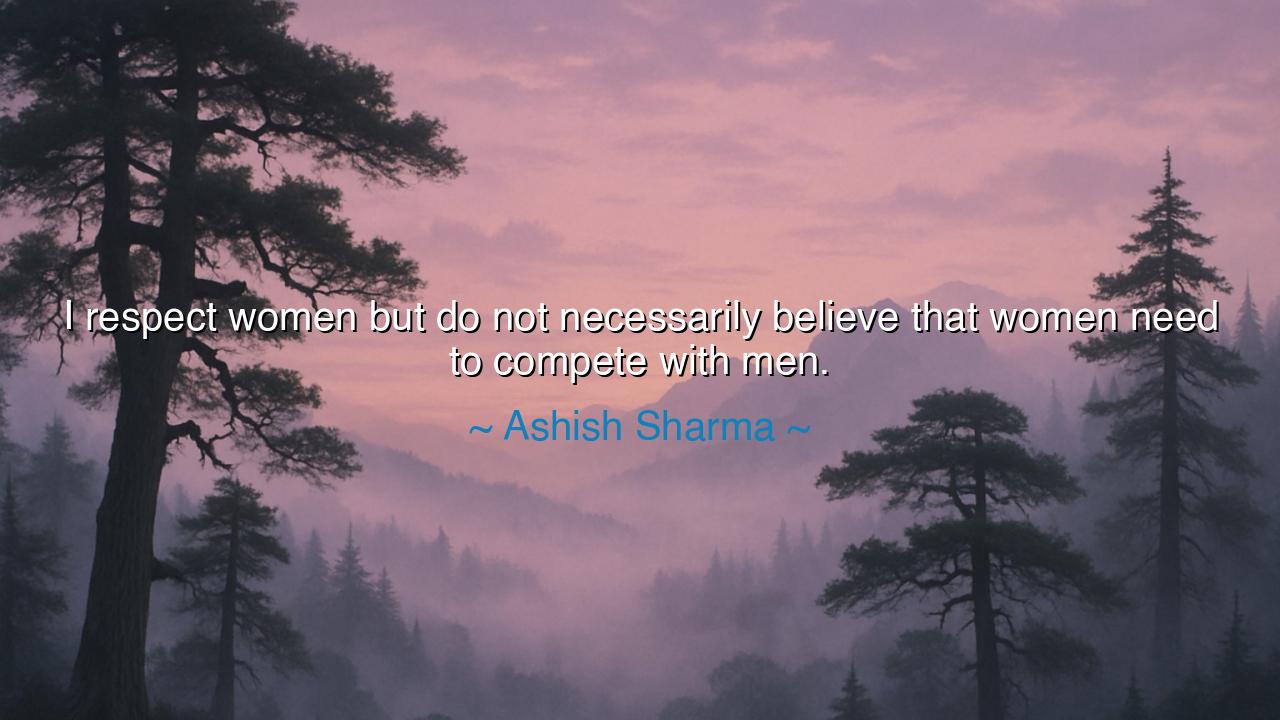
I respect women but do not necessarily believe that women need to






When Ashish Sharma declared, “I respect women but do not necessarily believe that women need to compete with men,” he spoke into a tension that has lingered across centuries — the balance between honoring difference and recognizing equality. His words, though simple, carry the weight of a deep truth: that dignity does not require rivalry, and that respect is not born from comparison but from recognition of intrinsic worth. In his statement, there is both reverence and caution, a call to value women without measuring them against the yardstick of men.
The meaning of his words lies in the rejection of false battles. Society has often framed progress as a contest between the sexes, as though one must conquer the other to prove value. Sharma reminds us that true respect does not demand this. Women do not need to prove themselves by mimicking men, nor to wrestle for validation in a game written by others. Their strength, wisdom, and creativity shine most brightly when honored on their own terms. To compete is sometimes necessary, but to live in perpetual competition is to lose sight of the harmony that builds families, communities, and nations.
The origin of such wisdom is ancient. In Vedic tradition, the feminine was revered as Shakti, the primordial energy of creation, not because she triumphed over men, but because she embodied power in her own right. Likewise, in Greek myth, Athena, goddess of wisdom, was honored not for imitating men but for bringing her own gifts of strategy, justice, and counsel. Across cultures, the highest form of respect was shown not in asking women to compete with men, but in acknowledging that their contributions flowed from a unique and essential source.
History offers us examples of this truth. Consider Florence Nightingale, who did not compete with generals on the battlefield, but transformed the very nature of warfare through nursing and public health. Her strength did not lie in adopting the roles of men, but in elevating the role of care to a force as powerful as any army. Or recall Marie Curie, who did not set out to compete but to pursue truth, and by her discoveries reshaped the world of science forever. In both, we see that greatness is not diminished when it is not defined by rivalry.
Yet Sharma’s words must also be read with discernment. To say that women need not compete with men is not to deny them equality of opportunity. It is not a call to confine women to silence or to limit their ambition. Rather, it is a reminder that respect arises from recognizing the value of each being’s path. When men and women are free to pursue their callings — whether parallel, divergent, or shared — the result is harmony, not strife. True dignity comes not from imitation, but from authenticity.
The lesson for us is this: do not measure your worth by comparison to another. Women, like men, carry their own strengths, their own battles, their own victories. To honor them is not to demand that they fight on the same fields, but to support them wherever their paths lead. Respect is not earned by proving sameness, but by recognizing difference without diminishing it.
Practical actions arise naturally. Men must honor women without asking them to conform to masculine standards. Women must remember that their value does not depend on mirroring men, but on being fully themselves. Together, both must create spaces where every contribution is cherished — in home, in work, in society. In doing so, they cease to be competitors and become allies, building a world where harmony, not rivalry, defines human progress.
Thus, Ashish Sharma’s words endure as guidance: true respect does not come from endless competition, but from recognition of worth beyond comparison. May we, like the sages of old, learn to see men and women not as rivals in a contest, but as companions in the great work of life, each bringing their own light to the shared horizon of humanity.






AAdministratorAdministrator
Welcome, honored guests. Please leave a comment, we will respond soon